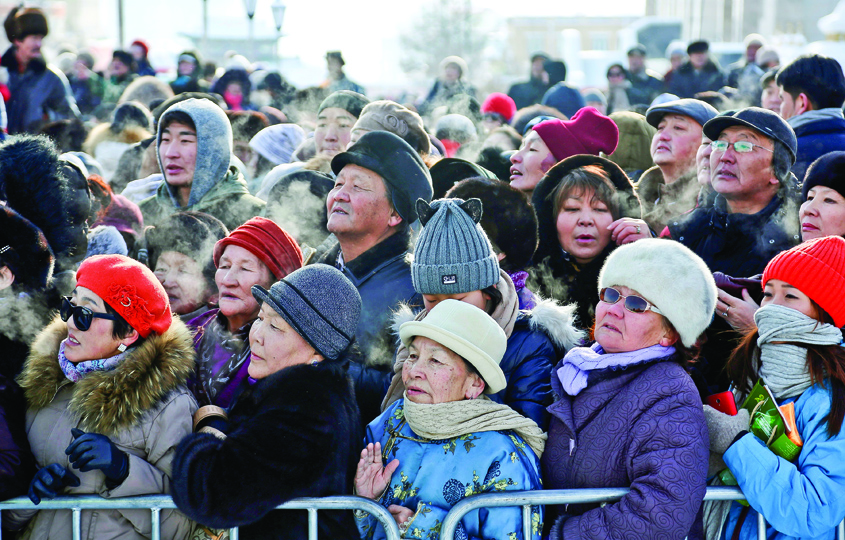Though described by Mongolian authorities as a purely religious visit and despite no officials having met him publicly, the Dalai Lama’s recent four-day (18-21 November 2016) visit to Mongolia predictably provoked a sharp reaction from Beijing. Mongolia has a historic, symbolic connection with Tibet ever since the Mongolian ruler Altan Khan conferred the title of the Dalai Lama (Ocean of Wisdom) on the Gelug monk, Sonam Gyatso, in 1578. The Ganden Monastery in Ulan Bataar keeps a throne reserved for the Dalai Lama.
That Mongolia, unlike other more powerful advanced nations, chose to ignore Beijing’s warnings and receive the Dalai Lama is significant, particularly considering that 90% of its total exports are to China. The day before the Dalai Lama’s arrival in the Mongolian capital of Ulan Bataar, his ninth visit since 1979, China’s Foreign Ministry spokesman Geng Shuang warned at a press briefing in Beijing: “We strongly urge Mongolia to act by keeping in mind the big picture of maintaining the stable development of bilateral relations and to keep their promises made on this issue. Do not allow the Dalai Lama to visit. Do not support or facilitate the separatist activities of the Dalai clique.”
Towards the end of the Dalai Lama’s visit on 20 November, Geng Shuang observed that Mongolia had “insisted on inviting the Dalai Lama despite attempts by China to dissuade them”. Expressing China’s “strong dissatisfaction and firm opposition to the Dalai Lama’s visit to Mongolia,” he described the Dalai Lama as “a political exile that attempts to split Tibet from the Chinese territory under the cloak of religion.” Separately, China’s authoritative, official news agency Xinhua the same day advised Mongolia “to eliminate the negative impacts of the Dalai Lama’s visit and refrain from disturbing the healthy development of China-Mongolia ties”.
Geng Shuang also declared China’s firm opposition to “…any contacts between the Dalai Lama and the authorities of any countries”. Implicit in this remark is an apparent attempt to further shrink the Dalai Lama’s interactions with world leaders and senior figures in foreign governments. The phrase appears to have come into usage by Chinese authorities since October this year. Interestingly, earlier on 4 November, Xinhua had objected to a meeting between the Speaker of the British House of Commons John Bercow and the “prime minister” of the Tibetan government-in-exile, Lobsang Sangay. Describing Lobsang Sangay as a “secessionist” and “ring leader” of the “self-proclaimed Tibetan government-in-exile”, it expressed strong dissatisfaction and said Britain had “severely damaged China’s core interests”. Later on 8 November, the Nepalese news portal “My Republica” reported that China had expressed “serious concern” to Nepal’s Foreign Ministry at the meeting between Nepal Congress (NC) President Sher Bahadur Deuba and Lobsang Sangay at a function organised in Goa by the private India Foundation.
As on past occasions, China followed up its warnings with prompt punitive action. Two sets of talks originally scheduled for the week beginning 28 November, were cancelled. Mongolia’s Foreign Minister Munkh-Orgil Tsend disclosed that one “meeting was intended for negotiations on soft loans and the projects on Tavan Tolgoi railroad, a copper plant and coal gasification project”. Mongolia was seeking a US$4.2 billion loan from Beijing to help it out of a deep recession. China also cancelled a bi-annual consultative meeting between the Parliaments of the two countries. There are doubts too whether Mongolian Prime Minister Erdenebat Jargaltulga’s visit to China next year will materialise.
By ignoring Chinese objections, though, Mongolia has asserted its independence and reinforced its unique link with the Dalai Lamas. Prompted by geopolitics, China too, which since around 2008 has reacted to meetings between the Dalai Lama and world leaders by suspending contacts and sharply reducing investments and bilateral trade for periods of up to two years, could dilute its response. The state-run Global Times on 21 November, quoted Da Zhigang, director of the Institute of Northeast Asian Studies at the Heilongjiang Academy of Social Sciences, as suggesting that China will this time take a pragmatic view keeping in view the importance of the “One Belt, One Road” to its leadership. Da Zhiqang observed that bilateral cooperation between China and Mongolia would continue, including the loan and the construction of a China-Mongolia-Russia economic corridor. He added that “China is unlikely to take economic sanctions as the country needs to maintain sound ties with Mongolia, which holds a good relationship with the US, North Korea and Japan, playing an important role in the Northeast Asia.” He did, of course, assert that “the Dalai Lama’s visit to Mongolia will certainly hurt the interactive relation that China and Mongolia have built through the Belt and Road initiative” and it was unacceptable to describe the visit as “purely religious”, given the Dalai’s consistent stance and activities to split China.
Jayadeva Ranade is a former Additional Secretary in the Cabinet Secretariat, Government of India and is President of the Centre for China Analysis and Strategy.

